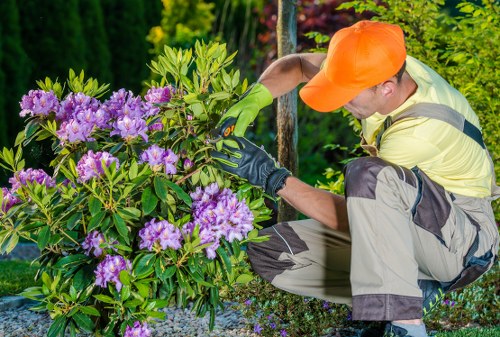Driveway Algae Removal in Collier Row: Keep Your Pathway Safe and Beautiful

Are you noticing green, slimy patches on your driveway in Collier Row? Algae growth can not only make your driveway look unsightly but also pose safety risks. Understanding how to effectively remove and prevent algae is essential for maintaining a clean and safe outdoor space.
Algae thrive in damp, shaded environments, making driveways particularly vulnerable, especially after periods of rain or high humidity. Ignoring algae growth can lead to slippery surfaces, which increase the risk of accidents for both pedestrians and vehicles.
Fortunately, there are several methods available for algae removal, ranging from simple DIY solutions to professional services. In this article, we'll explore the best practices for eliminating algae from your driveway and keeping it free from future growth.
Understanding Algae Growth on Driveways

Before tackling algae removal, it's important to understand what causes algae to flourish on driveways. Algae are simple plants that require moisture and shade to grow. Driveways often provide the perfect environment due to their exposure to rainwater and the shade from surrounding structures or trees.
Additionally, the presence of organic material, such as leaves and debris, can contribute to algae growth by retaining moisture and providing nutrients. This combination of factors creates a conducive environment for algae spores to germinate and spread.
Recognizing the conditions that promote algae growth can help you take proactive measures to prevent it from recurring after removal.
What Causes Algae to Grow on Driveways?
Several factors contribute to algae growth on driveways:
- Moisture: Persistent dampness due to rain or poor drainage.
- Shade: Limited sunlight exposure, often from trees or buildings.
- Organic Debris: Accumulation of leaves and other organic matter.
- Surface Material: Porous materials can retain moisture, fostering algae growth.
The Risks of Ignoring Algae on Your Driveway
Neglecting algae removal can lead to several issues:
- Safety Hazards: Algae can make surfaces slippery, increasing the risk of falls and vehicle accidents.
- Structural Damage: Persistent moisture can degrade driveway materials over time.
- Unsightly Appearance: Algae can detract from your property's curb appeal.
Effective Methods for Driveway Algae Removal

Removing algae from your driveway involves a few key steps, depending on the severity of the growth and the surface material. Here are some effective methods to consider:
1. **Pressure Washing**: Using a pressure washer can effectively remove algae from driveway surfaces. It's a quick method but requires caution to avoid damaging the surface.
2. **Chemical Cleaners**: Algae removers containing bleach or other cleaning agents can kill algae and prevent regrowth. It's important to use these products safely and follow the manufacturer's instructions.
3. **Natural Remedies**: For those looking for eco-friendly options, solutions like vinegar or baking soda mixed with water can be effective against algae.
DIY Cleaning Solutions
If you prefer to tackle algae removal yourself, several DIY solutions can be both effective and budget-friendly:
- Bleach Solution: Mix one part bleach with three parts water. Apply to the affected areas, let it sit for 15-20 minutes, then scrub and rinse thoroughly.
- Vinegar and Water: A mixture of equal parts white vinegar and water can help kill algae without the harshness of bleach.
- Baking Soda: Sprinkle baking soda on the algae, scrub with a brush, and rinse with water for an eco-friendly cleaning option.
Professional Driveway Algae Removal Services
For extensive algae growth or for those who prefer professional assistance, hiring a driveway algae removal service in Collier Row is a wise choice. Professionals use specialized equipment and cleaning agents to ensure thorough removal and long-lasting results.
Additionally, they can assess underlying issues, such as drainage problems, and provide solutions to prevent future algae growth.
Choosing the Right Algae Removal Service in Collier Row

Selecting the appropriate service provider is crucial for effective algae removal. Here's what to consider:
1. **Experience and Expertise**: Look for companies with a proven track record in driveway maintenance and algae removal.
2. **Customer Reviews**: While testimonials are excluded from the article, researching online reviews can provide insights into the company's reliability and service quality.
3. **Services Offered**: Ensure the company offers comprehensive solutions, including cleaning, sealing, and preventative measures.
What to Look for in a Service Provider
When evaluating algae removal services, consider the following:
- Certifications: Certified professionals are more likely to follow industry standards.
- Insurance: Ensure the company is insured to protect against any potential damages during the cleaning process.
- Environmental Practices: Companies that use eco-friendly products are preferable for minimizing environmental impact.
Benefits of Hiring Local Experts
Hiring a local service provider in Collier Row offers several advantages:
- Familiarity with Local Conditions: Local experts understand the area's climate and specific challenges related to algae growth.
- Quick Response Time: Proximity allows for faster service and flexibility in scheduling.
- Support Local Economy: Choosing local businesses contributes to the community's economic well-being.
Preventing Future Algae Growth on Your Driveway

After successfully removing algae, it's essential to take preventive measures to maintain a clean driveway:
1. **Improve Drainage**: Ensure that water flows away from the driveway to reduce moisture accumulation.
2. **Increase Sunlight Exposure**: Trim overhanging branches to allow more sunlight to reach the driveway surface.
3. **Regular Cleaning**: Schedule periodic cleanings to prevent algae from establishing a foothold.
Maintenance Tips for a Clean Driveway
Maintaining a clean driveway involves consistent care and attention:
- Remove Debris: Regularly clear leaves, dirt, and other debris that can trap moisture.
- Seal Driveway: Applying a driveway sealant can protect the surface from moisture and deter algae growth.
- Monitor for Cracks: Repair any cracks promptly to prevent water from seeping into the driveway material.
Nearby Areas in Collier Row for Driveway Algae Removal Services
Collier Row is surrounded by several neighborhoods that also benefit from professional driveway algae removal services. Here are some of the closest areas:
- Bury Green: Just north of Collier Row, Bury Green offers a mix of residential and commercial properties that require regular maintenance.
- Hadley Wood: Located to the east, Hadley Wood is known for its scenic streets where maintaining driveway aesthetics is a priority.
- Whetstone: Southwest of Collier Row, Whetstone has a bustling community with diverse driveway surfaces in need of upkeep.
- Cathays: South of Collier Row, Cathays features a range of properties from modern homes to older buildings, all susceptible to algae growth.
- Winchmore Hill: To the west, Winchmore Hill comprises historic residences where preserving driveway integrity is essential.
- Oakwood: Northeast of Collier Row, Oakwood's driveways often require specialized cleaning solutions to maintain their appearance.
- Pentonville: North-westernly positioned, Pentonville has both commercial and residential driveways that benefit from professional cleaning services.
- Strawberry Hill: Adjacent to Collier Row, Strawberry Hill's lush environment necessitates regular algae removal to keep driveways safe.
- Fortis Green: Located south-east, Fortis Green is another area where driveway maintenance is crucial due to high foot traffic.
- East Finchley: Further east, East Finchley offers diverse properties where algae removal services are in high demand.
Frequently Asked Questions
1. How often should I clean my driveway to prevent algae growth?
Regular maintenance is key. It's recommended to clean your driveway at least twice a year and more frequently if it's prone to algae growth due to environmental conditions.
2. Can I use household bleach for algae removal?
Yes, a diluted bleach solution can be effective. However, it's important to use it carefully to avoid damaging the driveway surface and surrounding vegetation.
3. Are there eco-friendly alternatives for algae removal?
Absolutely. Solutions like vinegar, baking soda, or commercially available eco-friendly algae removers can safely eliminate algae without harmful chemicals.
4. How long does it take for algae to grow back after removal?
The regrowth rate depends on local climate conditions, especially moisture and shade. Implementing preventive measures can significantly slow down or prevent regrowth.
5. When is the best time of year to perform algae removal?
Spring and early autumn are ideal times for algae removal, as the weather is conducive to drying and prevents immediate regrowth after cleaning.


